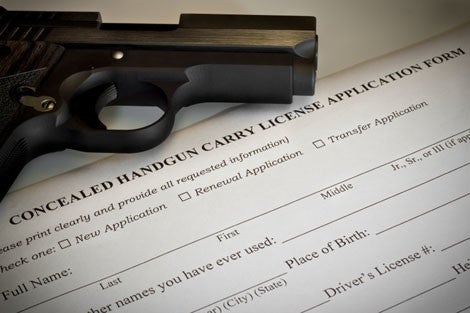For immediate release: April 16, 2015
Boston, MA – Who decides who can carry concealed firearms legally? Should local police chiefs have a say? Massachusetts police chiefs think so. A new survey finds that a large majority of Massachusetts police chiefs favor continuing to give local police discretion in whether or not to grant concealed carry hand gun permits in their jurisdiction. Massachusetts is one of nine states with a “may-issue” concealed carry permit law, which gives a police chief discretion in issuing a gun permit; most other states have “shall-issue” laws that limit police discretion. In about half of those states, police have no discretion at all and a police chief must issue a permit if the applicant passes a computerized federal background check.
The study was published online April 16, 2015, in the Journal of Public Health Policy.
“There are proposals to require reciprocity among states in terms of gun carrying permits. Reciprocity means that anyone with an Alabama permit could legally carry in Massachusetts. But before we begin a discussion about reciprocity, we first need evidence about who is obtaining permits in what types of regulatory regimes,” said co-author David Hemenway, professor of health policy at Harvard T.H. Chan School of Public Health and director of the Harvard Injury Control Research Center.
In the wake of the December 2012 Sandy Hook school shooting, Hemenway and James Hicks, the study’s co-author and chief of police of the Natick, Mass., Police Department, were appointed by the Speaker of the Mass. House of Representatives to an eight-person committee charged with recommending improvements to the state’s gun laws. At the time, Hicks was president of the Massachusetts Chiefs of Police Association.
The survey was sent via email by Hicks in December 2013 to the 351 members of the Massachusetts Chiefs of Police Association, who represent each city and town in the state. It received 121 responses. The responding police chiefs serve 28% of the Massachusetts population. Among the non-respondents were the chiefs from all 16 major Massachusetts cities (population greater than 60,000), and the chiefs from the very smallest towns.
The results found that approximately 90% of the responding police chiefs were in favor of keeping police discretion for the issuance of concealed carry permits. Fewer than 10% of respondents were against keeping discretion. Police chiefs reported approximately two discretionary denials each year.
The main reasons for discretionary denial fell under four general themes: providing false information, assaults, particularly domestic assaults, drug or alcohol abuse, and mental health issues—and there were often combinations of these reasons. Individuals denied a permit were often well known to police from multiple 911 calls to the residence involving violence.
“The evidence from our survey suggests that passing a federal background check may not always be enough to ensure that an individual does not pose a threat of violence to others or to themselves. Local police chiefs typically know more about the people in their community than does a national computer,” said Hemenway.
“May Issue Gun Carrying Laws and Police Discretion: Some Evidence from Massachusetts,” David Hemenway and James G. Hicks, Journal of Public Health Policy, April 16, 2015, doi: 10.1057/jphp.2015.11
Visit the Harvard Chan website for the latest news, press releases, and multimedia offerings.
For more information:
Marge Dwyer
mhdwyer@hsph.harvard.edu
617.432.8416
photo: iStockphoto.com
###
Harvard T.H. Chan School of Public Health brings together dedicated experts from many disciplines to educate new generations of global health leaders and produce powerful ideas that improve the lives and health of people everywhere. As a community of leading scientists, educators, and students, we work together to take innovative ideas from the laboratory to people’s lives—not only making scientific breakthroughs, but also working to change individual behaviors, public policies, and health care practices. Each year, more than 400 faculty members at Harvard Chan teach 1,000-plus full-time students from around the world and train thousands more through online and executive education courses. Founded in 1913 as the Harvard-MIT School of Health Officers, the School is recognized as America’s oldest professional training program in public health.
